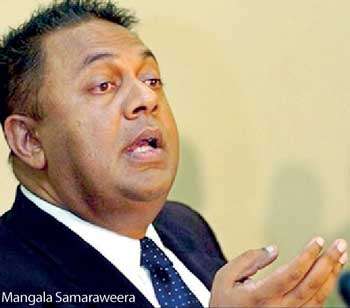23 Jun 2018 - {{hitsCtrl.values.hits}}
 As the government is moving forward with expanding market access for Sri Lankan exporters, sustainable resource management practices remain crucial to successfully penetrate into advanced markets such as the European Union (EU) asserted the Minister of Finance and Mass Media, Mangala Samaraweera.
As the government is moving forward with expanding market access for Sri Lankan exporters, sustainable resource management practices remain crucial to successfully penetrate into advanced markets such as the European Union (EU) asserted the Minister of Finance and Mass Media, Mangala Samaraweera.
Participating as the Chief Guest at the Regional Symposium on Sustainable Development Goals organised by the Ministry of Fisheries and Aquatic and Rural Economic Development, Samaraweera highlighted that the reinstatement of GSP Plus in May 2017 and Sri Lanka’s commitments for sustainable resource management helped the seafood exports to the EU, which have increased by 125 percent in 2017, which was one of the major success stories of the government’s efforts to open up market access for Sri Lankan exporters.
According to the latest EDB export data based on Customs data, the fish and fisheries exports to the EU have grown by 82.7 percent to reach US$32.29 million during the first four months of the year.
Sri Lanka saw seafood exports to EU increasing significantly after the EU completely lifted the 15-month ban on import of Sri Lanka seafood in June 2016 which was supported by the reinstatement of GSP Plus in May 2017. The EU ban was imposed on the ground that Sri Lanka indulged in “illegal, unreported and unregulated fishing.”
“Sustainable resource management is essential in order to successfully export to markets such as the EU. It is precisely this type of sustainable export industry that was envisaged in the 2018 Budget, themed “Blue Green Economy: Enterprise Sri Lanka,” the minister added.
According to Samaraweera, the fisheries industry’s output accounts for around 2 percent of GDP while contributing for value addition of more than US$ 1.3 billion and creating 222,000 direct jobs, supporting more than 191,000 households.
Elaborating the government’s sustainable initiatives towards expansion of supply to cater to growing demand in these markets, He noted that a 50 percent subsidy is given for investing in technology such as refrigerated storage to mitigate post-harvest losses in multi-day boats and another 50 percent subsidy is made available to those who purchase multi-day boats to encourage deep sea fishing.
The government also plans to spend Rs. 2 billion in upgrading anchorages and landing sites of fishery harbours including those in Chilaw, Mirissa, Karainaga, and Purana Wella which is aimed at reducing post-harvest losses and enhancing overall sustainability of the industry.
Samaraweera reiterated that curbing Illegal, Unregulated, Unreported (IUU) fishing as well as fishing methods such as mechanised and bottom trawling have a multitude of negative externalities that need to be addressed in a holistic manner through multilateral cooperation.
Assuring the government’s commitment in curbing marine pollution and preserving the marine eco systems, He noted that reducing marine pollution and mitigating its effects in Sri Lanka has been prioritised in the 2018 budget under the Blue-Green initiatives, and the government of Sri Lanka has allocated around Rs.6 billion to implement long-term solutions to reduce and eliminate marine pollution and develop sustainable fishing practices.
“To protect the delicate eco-systems that thrive on coasts, as well as to create further investments in the tourism and fisheries industries, measures are taken to replenish and conserve the coast in areas such as Mt. Lavinia, Ratmalana, and Angulana. Programmes for mangrove protection and replanting are also being financed by the budget.” Samaraweera added.
Moreover, he said that the government is taking initiatives to protect numerous lagoons around the island so as to restore their unique eco-systems and make them resilient to climate change.
“Hotels and other industries that dispose their waste to the ocean and lagoons will be assisted in investing in technology to ensure zero discharge of waste,” he noted. The minister emphasised that this sustainable management of marine resources stands to the tourism sector.
“Accordingly, areas such as Pigeon Island, Bar Reef, and Delft Island have been declared as conservation and marine protected areas. Several conservation measures have been adopted to protect turtles, dolphins, sharks, whales, and other marine animals by establishing the regulations under the relevant legislation.” He said.
Samaraweera also announced that a virtual institute for the blue-green economy has been already launched as a pilot project, to create and sustain spinout programmes identified under the Blue-Green initiative.
18 Nov 2024 9 minute ago
18 Nov 2024 1 hours ago
18 Nov 2024 1 hours ago
18 Nov 2024 1 hours ago
18 Nov 2024 1 hours ago